As part of Member Appreciation Month, our vendor partner GEICO* provided us with 20 prize packages to give away to members. Congratulations to the winners named below:Janice GascoigneHeidi HoffeeBruce FalkDawn MarlowRaleigh KalbfleischMario CarlasareJean Grommes FeehanJennifer Rhodes YengoyanLarry SandersJoe DvorakRachelle RagoRobert J. DuffinRobert SternbergLisa NijmRick RogersLisa DannewitzAlen TakhshIain JohnstonDion DaviBary GassmanBonus winner (1st person to enter contest): Sheina FrancoWinners will receive an email with additional information.Prize packages include:A large or extra-large "Guess what day it is?" camel hump-day t-shirtA copy of the Gecko's new book, "You're Only Human: A Guide to Life"A Gecko cinched logo knapsac
ISBA members, sign up to receive The Bar News' biweekly e-newsletter by emailing emailpreferences@isba.org
-
May 14, 2015 |
ISBA News | Member Services
-
May 13, 2015 |
Practice News
When it comes to sharing digital files -- whether documents, music, or almost anything else -- the ubiquitous Dropbox is sure to come to mind. But lawyers have to meet a high security standard, and "[a]lthough Dropbox encrypts the files on its server, Dropbox has had at least one security incident in the past, and Dropbox maintains a master key to the files," writes Chicago lawyer and tech expert Todd Flaming in the latest ISBA Standing Committee on Legal Technology newsletter.What if you want more security for the files you're sharing on Dropbox? "[C]onsider using an add-on product called Boxcryptor," Flaming writes. "It creates a virtual drive on your computer that allows you to encrypt your files locally before uploading them to the cloud."How? "Boxcryptor uses your own personal encryption key to encrypt every file before the file is saved into Dropbox and decrypt the file before you open it," Flaming writes "Thus, when the file is uploaded to Dropbox, it is already encrypted, and no one has the key."Find out more in Flaming's article, where he also discusses the pros and cons of Boxcryptor and gives a remarkably short but clear explanation of cloud computing and how it works.
-
May 13, 2015 |
Member Services
As part of Member Appreciation Month, our vendor partner GEICO* has provided us with 20 prize packages to give away to members. ENTER THIS 1 DAY ONLY DRAWING FOR A CHANCE TO WIN! Prize packages include:A large or extra-large "Guess what day it is?" camel hump-day t-shirtA copy of the Gecko's new book, "You're Only Human: A Guide to Life"A Gecko cinched logo knapsack
-
May 13, 2015 |
Practice News
Asked and AnsweredBy John W. Olmstead, MBA, Ph.D, CMCQ. I am the sole owner of a debtor bankruptcy practice. I have one other attorney and three staff members. Last year we spent $50,000 of advertising. Our fees collected were $550,000 and Net Income was around $160,000. Are we spending too much?A. You are spending 9% of fee revenue. I believe that in a consumer practice such as personal injury and debtor bankruptcy you have to spend around 10% of fee revenue to get the business you need to sustain the practice. I have some practices spending 19% of revenue. So, I don't think you are necessarily spending too much if the advertising is working for you. You have to constantly measure the ROI on your advertising and fine tune it when needed.Also, insure that the business is actually coming from the advertising - in other words don't advertise to get business you would have had anyway or in a market that you have saturated and more advertising will not yield any additional business.Click here for our blog on marketingClick here for articles on other topics
-
May 13, 2015 |
Practice News
Q. Do I have a duty to notify the opposing party when I receive documents that were inadvertently sent to me in discovery?A. IRPC 4.4(b) states that a “lawyer who receives a document relating to the representation of the lawyer’s client and knows that the document was inadvertently sent shall promptly notify the sender.” Comment [2] to that rule says any additional steps, such as returning the original document, are beyond the scope of these Rules. ISBA members can browse past ISBA Ethics Opinions, access our Ethics Hotline, and other resources on the ISBA Ethics Page.[Disclaimer. These questions are representative of calls received on the ISBA’s ethics hotline. The information provided below is meant as an educational tool to highlight potentially applicable Illinois RPC or other ethics resources that might help the lawyer answer the question posed. The information provided isn’t legal advice. Because every situation is different, often complex, and the law is constantly evolving, you shouldn’t rely upon this general information without conducting your own research.]
-
May 13, 2015
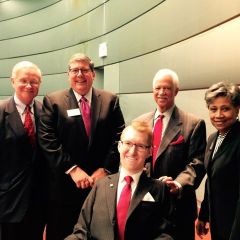 Justices of the Illinois Supreme Court administered the attorney’s oath to 600 new attorneys on Thursday, May 7 at five separate locations across the state.
Justices of the Illinois Supreme Court administered the attorney’s oath to 600 new attorneys on Thursday, May 7 at five separate locations across the state. -
May 13, 2015
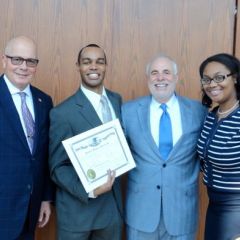 Supreme Court Justice Robert R. Thomas presided over the Second District in Elgin. Appellate Justice Ann B. Jorgensen made the motion to admit the class. Cook County Circuit Judge Russell W. Hartigan, third vice president of the Illinois State Bar Association, and Lisle attorney James McCluskey, who is a member of the ISBA Board of Governors, seconded the motion.
Supreme Court Justice Robert R. Thomas presided over the Second District in Elgin. Appellate Justice Ann B. Jorgensen made the motion to admit the class. Cook County Circuit Judge Russell W. Hartigan, third vice president of the Illinois State Bar Association, and Lisle attorney James McCluskey, who is a member of the ISBA Board of Governors, seconded the motion. -
May 13, 2015
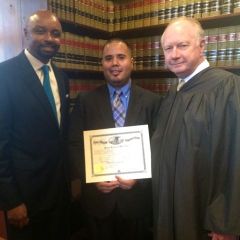 Supreme Court Justice Thomas L. Kilbride presided over the Third District ceremony held at the Third District Appellate Court Building in Ottawa. Joliet attorney Vincent F. Cornelius, second vice president of the Illinois State Bar Association, also gave remarks.
Supreme Court Justice Thomas L. Kilbride presided over the Third District ceremony held at the Third District Appellate Court Building in Ottawa. Joliet attorney Vincent F. Cornelius, second vice president of the Illinois State Bar Association, also gave remarks. -
May 13, 2015
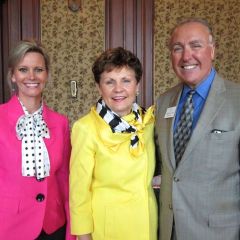 Supreme Court Chief Justice Rita B. Garman presided over the Fourth District ceremony at the Illinois Supreme Court Building in Springfield. The speaker for the ceremony was Circuit Judge April G. Troemper in Springfield of the Seventh Judicial Circuit. Other speakers included ISBA President-Elect Umberto S. Davi, a solo practitioner in Western Springs, and William F. Moran III, a managing partner at Stratton, Giganti, Stone, Moran & Radkey in Springfield.
Supreme Court Chief Justice Rita B. Garman presided over the Fourth District ceremony at the Illinois Supreme Court Building in Springfield. The speaker for the ceremony was Circuit Judge April G. Troemper in Springfield of the Seventh Judicial Circuit. Other speakers included ISBA President-Elect Umberto S. Davi, a solo practitioner in Western Springs, and William F. Moran III, a managing partner at Stratton, Giganti, Stone, Moran & Radkey in Springfield. -
May 13, 2015
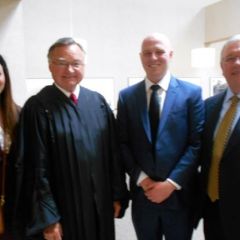 Supreme Court Justice Lloyd A. Karmeier presided over the Fifth District ceremony at the Southern Illinois University School of Law Auditorium in Carbondale. The speaker for the ceremony was Russell K. Scott, a member of the Illinois State Bar Association Board of Governors.
Supreme Court Justice Lloyd A. Karmeier presided over the Fifth District ceremony at the Southern Illinois University School of Law Auditorium in Carbondale. The speaker for the ceremony was Russell K. Scott, a member of the Illinois State Bar Association Board of Governors.

